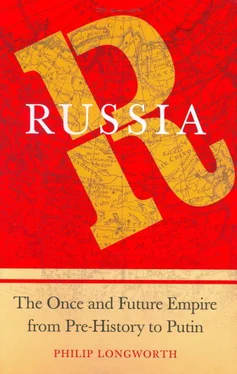Peter’s instructions to Artamon Volynskii, whom he had appointed envoy to Persia in 1715, suggest as much. They focused particularly on Persia’s trade and its communications with India. At the same time, watchful Russian eyes were trained on the Caucasus. Peter had in mind the creation of an emporium somewhere in this mountainous and treacherous region to serve as Russia’s base for trade with Persia, India and beyond. And in 1721 an opportunity arose when the chief of the Lezghians asked for Russian support against Persia. Peter decided not to let the opportunity slip, and ordered substantial forces to muster at Astrakhan the following spring. At that point it was learned that the Afghans had also rebelled against the Shah. When the Safavid dynasty crumbled, Russian intervention became urgent, since the crisis in Persia would certainly bring the Turks in to exploit it. Peter himself travelled with the expedition to the Caspian.
The coastal town of Derbent surrendered without a fight, but Baku resisted and Peter turned back. At one point on this expedition an officer suggested to him that it would be much easier, and cheaper, to get to India via the river system of Siberia and the Pacific. Peter replied that the distance was too great. Then, pointing south towards Astrabad in the southeastern corner of the Caspian, he remarked that from Astrabad ‘to Balkh and Badakshan with pack camels takes only twelve days. On that road to India no one can interfere with us.’ 14In this Peter revealed his chief motive in going to war with Persia — a war which would continue until 1735.
Meanwhile Russia involved itself in the politics of the Central Asian steppe. In 1723 the Kalmyks began to move into the valley of the Syr-Darya and towards Tashkent, forcing the Kazakhs west and north, and in 1725 some Kazakhs approached the Russian government with a request to be taken under its protection. The Russians set out to gain control of the northern part of the desert steppe, in order both to protect west Siberia and to trade with the Kazakhs. Mutual need promoted co-operation, but Russia soon became the dominant partner — thanks to its trading position rather than force. Thereafter it was to be a matter of negotiating and renegotiating terms as the local situation and the aims of Russian strategy changed. Before long Kazakhs were helping to guard the Orenburg area, which soon became a focus for Kazakh trade. Thenceforth St Petersburg was able to control the Kazakhs by offering economic incentives and controlling the prices of the goods they needed and wanted to sell. 15On the Central Asian front ambition might have exceeded capability in the short term, but Peter’s aims were to be pursued with vigour in the two decades following his death in 1725.
Peter’s preference for a Persian road to India and his preoccupation with the Swedish war had led to his neglecting Siberian affairs. In 1708 Siberia had become a province (guberniia), one of eight into which Peter divided his realm, but it was so vast and had such difficulties of communication that it had to be divided into five only slightly more manageable districts. Three years later all Siberia was put in the charge of the experienced Prince Matvei Gagarin, who had headed the central government’s Siberian Department and was now allowed to continue in that office. The arrangement left lines of responsibility unclear, and gave him far too much power. The door to corruption was left open, and Gagarin strode happily through it. In particular he defrauded the government by breaching its China trade monopoly, selling permits to merchants and his own goods to the Chinese, representing them as the state’s. So far from being exclusive, the princely title in Russia was heritable by all descendants, not only the eldest of each generation, and it did not save Gagarin from retribution. He was hanged publicly in St Petersburg in 1714, as a warning to others. The warning was repeated in the edict (ukaz) on the Preservation of Civil Rights issued eight year later: ‘Anyone… behaving like Gagarin contrary to this decree shall be put to death as a law breaker and an enemy of the state… [without being given] mercy on account of his former merits.’ 16
Meanwhile the frontier in Siberia was being pushed further out, the limits of the unknown receding. In 1696 a handful of Cossacks sent to subdue local Koriak tribesmen had found their way to the river Kamchatka and back to their base fort on the Anadyr. It took until 1711 to bring all of the great Kamchatka peninsula under control. Of its inhabitants, the Kamchadales were to be described as ‘timorous, slavish, and deceitful’, but in 1706 they had rebelled, attacked a Russian fort, and slaughtered many Cossacks. As for the Koriaks themselves, they spoke loudly ‘with a screeching tone’ and, according to Stepan Krashennikov, who was sent to study Kamchatka and its peoples later in the century, were ‘rude, passionate, resentful… cruel’ and ridden with lice, which they ate. They ‘never wash[ed] their hands nor face, nor cut their nails… [ate] out of the same dish with the dogs… [and] everything about them stinks of fish.’ 17
This was not a simple case of better-armed colonizers coming to exploit and oppress innocent but backward natives. These natives could be bellicose (they rebelled in 1710 and again in 1713), and the Kamchadales treated enemies who fell into their hands barbarously — burning them, hanging them by their feet, tearing out their entrails, lopping their limbs off while they were still alive.
In 1714 Peter sent shipwrights to Okhotsk, on the mainland coast opposite Kamchatka in order to bypass Koriak territory. If there were assets to be had there the colonizers might have found the risks posed by natives worthwhile, but in this region there were few resources except for fish and reindeer, and Russia had no shortage of either. Hence the development of Okhotsk to the north of Sakhalin, westward from Kamchatka across the Sea of Okhotsk. However, the Russian population of eastern Siberia was small (66,000 in 1710), and it grew little for some time thereafter. 18
At the time of Peter’s death it was still not certain whether Siberia was contiguous to North America or separated by the ocean, but in that year steps were taken towards finding the answer. Peter’s widow and successor, Catherine I (a former serving girl captured in Livonia), commissioned Vitus Bering, a Danish sailor in the Russian service, to go east to Okhotsk and Kamchatka, build two ships, and sail them east.
You shall endeavour to discover, by coasting with these vessels, whether the country towards the north, of which at present we have no distinct knowledge, is part of America or not.
If it joins the continent of America, you shall endeavour, if possible, to reach some colony belonging to some European power; or in case you meet with any European ship, you shall diligently enquire the name of the coasts, and such other circumstances as it is in your power to learn…
It was to take Bering two years to reach Okhotsk overland, and another year to build the boats, but at last, on 14 July 1728, he set sail in the St Gabriel with two officers and a crew of forty. On 8 August he met a Chukchi in a boat, and soon some islands, but spied no other land. 19Thus Bering discovered the strait that was to be named after him, returning to base that same September. The islands, which we now know as the Aleutians, and the surrounding waters turned out to be rich in sea otter and other animals yielding valuable furs, but this was incidental. Russia was already feeling its way to becoming a Pacific power. 20
There is a widespread assumption that the reasonable, co-operative face which Russian imperialism sometimes showed to newly associated or subject peoples had the purpose of lulling suspicions and masked an intention to dominate as soon as circumstances permitted. This interpretation is largely the work of latter-day nationalists, for whom the imperialist power is ever the villain against which the virtuous oppressed have to struggle for their freedom. Such a telling of the story does not always conform with the historical record. It does not in the case of Central Asia, where the security and development of commerce was the spur, negotiation and the manipulation of interests the means, and political domination only incidental — a means to secure other objectives. Nor does it in the case of Ukraine.
Читать дальше





![Stephan Orth - Behind Putin's Curtain - Friendships and Misadventures Inside Russia [aka Couchsurfing in Russia]](/books/415210/stephan-orth-behind-putin-s-curtain-friendships-a-thumb.webp)





